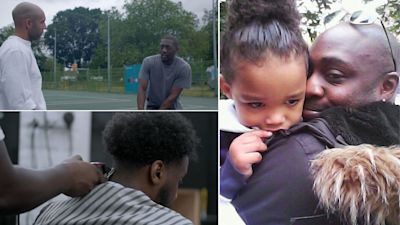'Black boys can cry': How a simple conversation could save someone's life

ITV Weather Presenter Alex Beresford opens up about the heartbreaking death of his friend that inspired his new documentary
You can’t rush time or healing, but making ‘Black Boys Can Cry’ definitely came at the right time and undoubtedly helped with healing.
I’ve long been a passionate advocate for mental wellbeing, even before I knew it was mental health we were all talking about.
Feeling different from everyone else didn’t always have a label and it’s not the easiest of conversation starters - but as the saying goes, “life is too short”, and when a very close family friend I’ve known my whole life tragically cut his own short, I knew the worst thing we could do was shush it away and never say his name again.
Martin Luther Walker was a great father, son, and brother who was highly respected in my hometown of Bristol’s music scene, where he was known as Sirplus.
Alex Beresford opens up about the heartbreaking death of his friend
Anyone will tell you his smile lit up any room he walked into, but I can’t forget the deep sadness I felt on his passing, 18 months after a tragic night in May 2019.
As you can imagine it brought a mountain of grief to his family and friends, but even in our mourning silence I made a pact with my best friend, Martin’s brother Leon, that we would tell his story in the hope that at the very least even one person’s life could be changed and saved.
When we sat down in my house to start filming Black Boys Can Cry we hadn’t actually spoken about what we’d say - so I had no idea how far the conversation would go - but Leon was very clear: “Let’s not set boundaries.”
When talented Director Jessicah North checked to see how all three of us were feeling. I’d also invited Martin’s older brother Marvin, who is also the Mayor of Bristol, to join us too.
It's the first time we’ve all been this publicly open about what’s happened, but now feels right.
It was quite a surreal moment, almost like an outer body experience, when at one point all three of us couldn’t fight back our tears, but on reflection it wasn’t surreal at all, it was real.
No more hiding how we really felt.
Alex Beresford speaks to a barber who hopes a simple chat with a customer could help save their lives
Through Black Boys Can Cry, we hope to encourage open conversations between Black boys and men across the country - but also among wider society, with suicide being the biggest killer in men under 50.
However, while mental health issues can affect anyone in any community, Black men and boys are more likely to be exposed to some of the biggest risk factors behind them.
Poverty, discrimination, trauma and the expectations of what a Black masculinity is can be challenging if you don’t fit into the stereotypical traits of being strong, sporty and gifted in music, and even if you do fit, there’s no guarantee you won’t be unaffected.
Former footballer Marvin Sordell opens up about a suicide attempt he'd kept quiet about for years
I’ve only met one footballer who’s consciously walked away from earning thousands of pounds a week.
While it’s easy to flippantly scream “are you mad”, when I interviewed Marvin Sordell I had nothing but admiration.
There are many who would struggle, and perhaps are struggling, to walk away from the most popular sport in the world, but Marvin quite simply couldn’t afford not to.
The subject of black masculinity was a reoccurring theme whilst making Black Boys Can Cry.
In the past I will admit to thinking I needed to appear a certain way to be accepted and not seen as different.
I’ll never forget the night before I was due to meet Olivier-nominated playwright Ryan Calais Cameron.
Dr Lade Smith explains why Black men in the UK are particularly vulnerable to mental health issues
I read his West End play ‘For Black Boy Who Have Considered Suicide When The Hue Gets Too Heavy’.
Every page turn led to another realisation, followed by another laughing into my hand’s moment.
In some way I related to all six characters who meet in group therapy. It made my meeting with the most hilarious Nigerian Drag Queen, Son of a Tutu, even more poignant.
There’s a moment when they tell me about their coming out experience.
I’d never considered how having your family, the whole community and the church turn against you in your most vulnerable moment could feel.
Black Boys Can Cry is available to watch now on ITVX and will air on Sunday at 10:45pm on ITV1
If you are struggling with your mental health, help is available.
Samaritans operates a 24-hour service available every day of the year, by calling 116 123. If you prefer to write down how you’re feeling, or if you’re worried about being overheard on the phone, you can email Samaritans at jo@samaritans.org
Call the Campaign Against Living Miserably (CALM) on 0800 58 58 58
See more links to advice and support here.
Want a quick and expert briefing on the biggest news stories? Listen to our latest podcasts to find out What You Need To Know...